
[ad_1]

People walking through coffee plantations on the new wooden bridge developed by AP Forest Development Corporation close to Galikonda viewpoint, near Araku, 150 kilometres from Visakhapatnam.
| Photo Credit: KR Deepak
Serene landscapes, lush coffee plantations and a peek into tribal culture: this winter Araku offers experiences that blend adventure, Nature and culture. Here’s a look at five attractions to explore during a trip to this verdant valley.
A walk through the woods
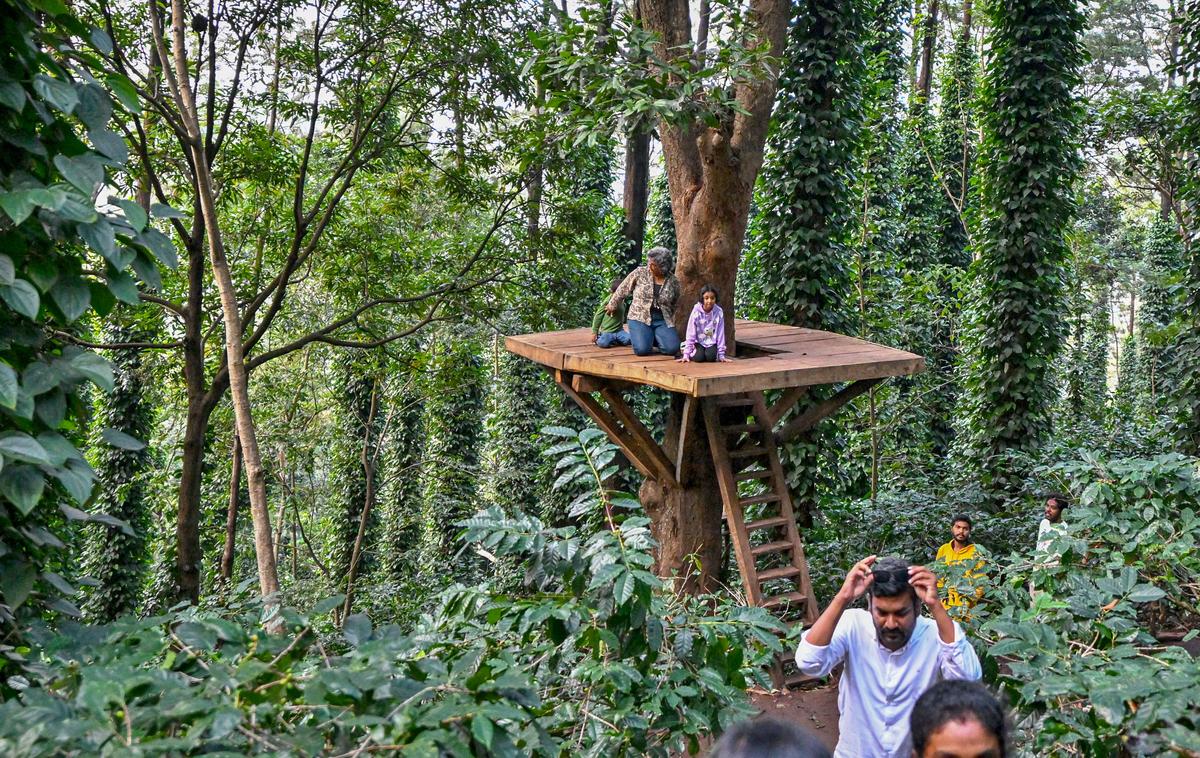
People walking through a cabbage field near Araku, 150 kilometres from Visakhapatnam.
| Photo Credit:
KR Deepak
Hidden within the emerald folds of Anantagiri’s coffee plantations, a wooden bridge invites visitors into Nature’s embrace. Aptly named Aranya, the 120-meter-long wooden bridge near Sunkarametta built by the Andhra Pradesh Forest Development Corporation is more than just a walkway — it’s an experience. Recently inaugurated, the bridge winds gracefully into the heart of the coffee plantation. Nestled under a verdant canopy of towering silver oak trees, their slender forms sway gently in the misty breeze. The air is rich with the aroma of coffee and pepper, as vines wrap themselves around the oak trunks. Aranya doesn’t just offer a walk; it provides a space to linger. Two wooden decks along the bridge offer the perfect perch to take in the panoramic views of the plantation below. A quaint tree hut adds to the allure, inviting visitors to climb up and gaze at the vast greenery from a unique vantage point.
Adding a splash of culture to the scenery are three women from the nearby Madagada village, who have set up a costume corner for visitors. Here, you can dress in tribal attire and snap pictures amid the plantation backdrop. “This place is picking up fast, especially on weekends,” shares K Krishna, the Forest Department staff member manning the entry tickets. The influx of tourists has been remarkable, drawn to the charm and immersive activities. A dedicated selfie point is also in the works, ensuring that every visitor leaves with a memento. On the flip side, the winding arterial roads leading to the location are chock-a-block with vehicles on weekends with the peak tourist season setting in.
The entry ticket costs ₹50 and the timings are 8.30am to 5.30pm
Floating above the mist
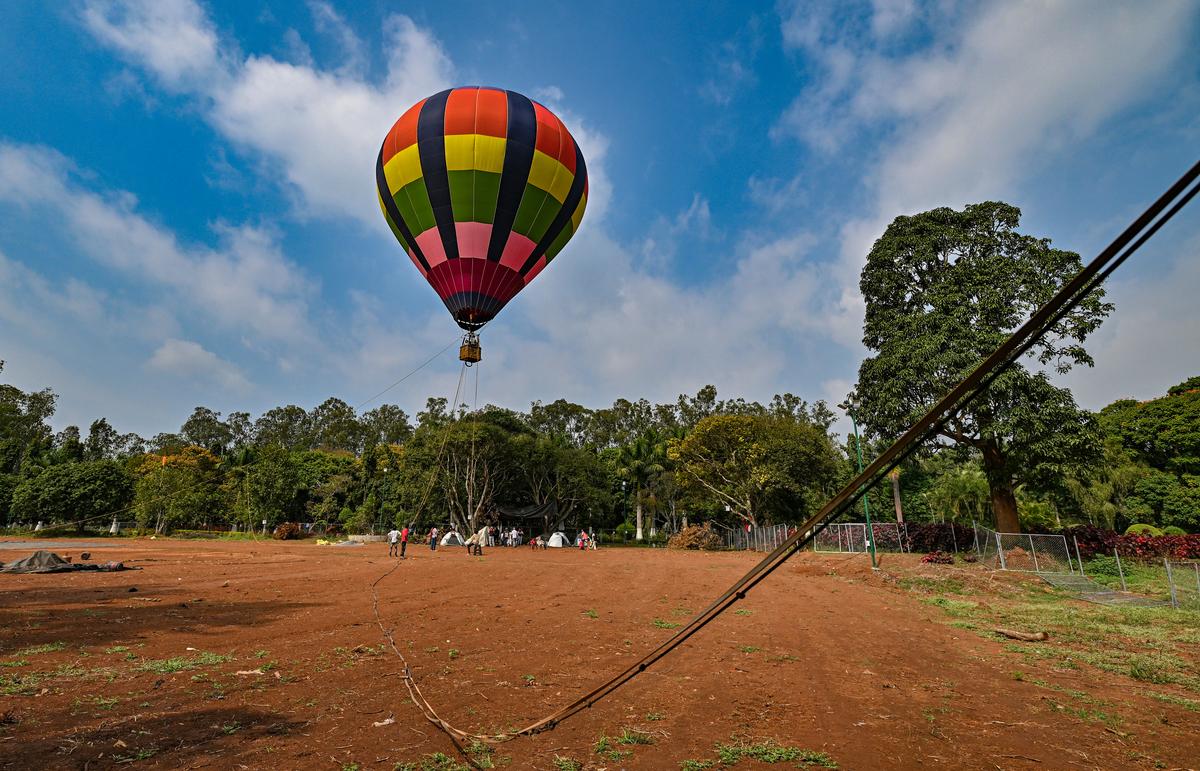
People taking a ride on the tethered hot air balloon at Padmapuram Gardens in Araku, 150 kilometres from Visakhapatnam.
| Photo Credit:
KR Deepak
The newly-introduced tethered hot air balloon ride at Padmapuram Gardens in Araku is an experience that is drawing adventurers and Nature lovers alike. The ride, priced at ₹1,500 per person, is a three-minute journey into the skies. Though tethered for safety, the balloon ascends to a height that provides breath-taking views of Araku’s serene landscapes. Starting as early as 6.30am, the rides are perfectly timed to capture the beauty of the sunrise, when the mist hangs low over the fields and the first rays of sunlight bathe the valleys in golden hues. From the vantage point of the balloon, Padmapuram Gardens reveals itself in a new light. The neatly landscaped gardens with dashes of seasonal blooms, stretch below like a vivid patchwork quilt. The tethered design ensures safety, making it suitable even for first-time flyers or families with children. For photography enthusiasts, this ride offers an opportunity to capture the scenic charm of Araku from a bird’s-eye view.
A journey through indigenous culture
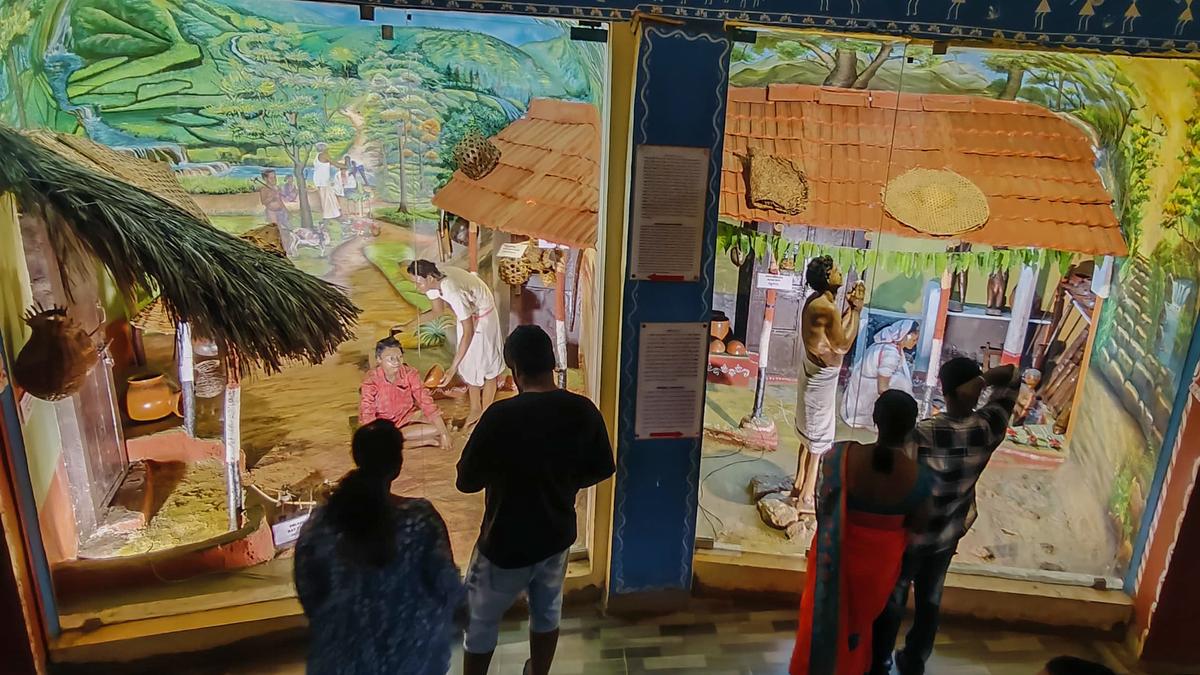
People going around the exhibits at the renovated Tribal Museum at Araku, 150 kilometres from Visakhapatnam.
| Photo Credit:
KR Deepak
The renovated Tribal Museum at Araku offers visitors a journey through the cultural tapestry of the region’s indigenous communities. With its enhanced displays, the museum stands as a testament to the rich heritage, rituals and lifestyles of the tribal groups inhabiting the Eastern Ghats. The highlight of the museum is the series of well-lit, life-size sculptures and colourful illustrations that bring to life the daily routines, festivities, and traditions of the tribal communities. From a sculpted depiction of a tribal family preparing meals in a bamboo hut to a vivid portrayal of their ceremonial dances and the bustling weekly shandy (market), every display exudes authenticity and attention to detail. The strategic lighting emphasises the intricate features of the sculptures, making the scenes appear almost lifelike.
One striking exhibit showcases the lifestyle of the Gadaba tribe of Paderu living in a mud house with walls decorated with red and black clay. Another exhibit features women weaving small baskets from leaves, their faces carved with expressions of concentration and joy. The vibrancy of a tribal festival is captured in another display depicting drummers and dancers adorned in traditional attire. The realism of these sculptures immerses visitors in the essence of tribal life, offering a glimpse of their customs and values. Each exhibit has a detailed information board, providing insights into the significance of tribal rituals, agricultural practices, and craftsmanship. The newly landscaped surroundings of the museum complement the exhibits inside. The place also features adventure activities like obstacle course, sky cycling and zipline, among others.
A tranquil retreat
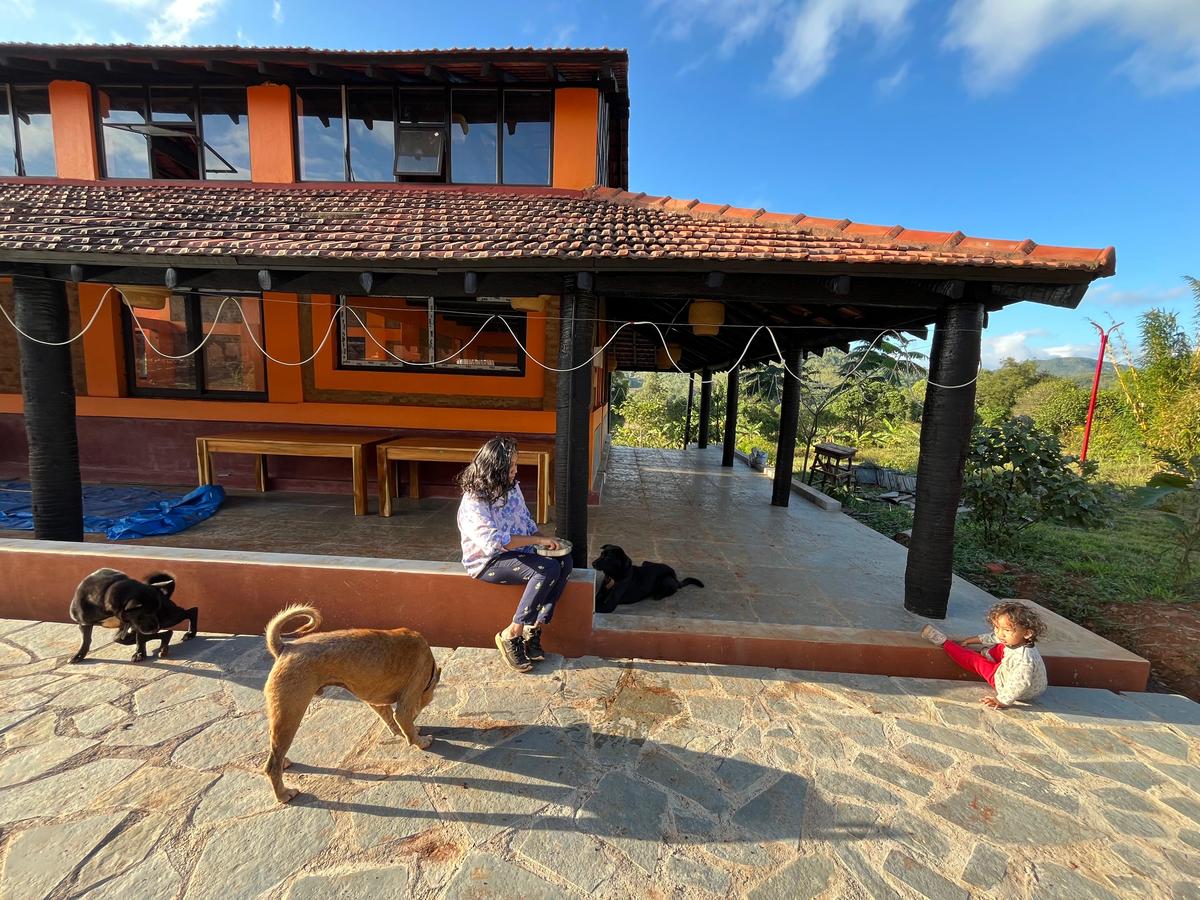
A view of Mandala Farms in Araku, 150 kilometres from Visakhapatnam.
| Photo Credit:
SPECIAL ARRANGEMENT
For those seeking a tranquil escape, the newly-opened Mandala Farm in Araku offers a retreat that bridges the gap between modern luxury and Nature’s tranquillity. The accommodations at Mandala are thoughtfully designed to reflect its commitment towards creating a sustainable setup. The high-ceilinged cottages, each with a wooden ladder leading to an additional floor, exude the essence of an eco-friendly lifestyle with a harmonious blend of minimalism and comfort. Large windows frame breathtaking views of the hills, and the earthy tones of the interiors provided a sense of warmth. The absence of televisions is a deliberate choice, encouraging guests to disconnect from the digital world and reconnect with Nature. This eco-conscious retreat takes meaningful steps to champion no-plastic policies. Here, single-use plastic products are conspicuously absent. Guests are provided with refillable steel bottles, bamboo baskets and food served in reusable crockery and paper plates. The space plans to open the concept of farm-to-table meals prepared with freshly harvested produce.
(Contact the farm at the Instagram handle @mandalafarms_arakuvalley)
The buzz of natural farming
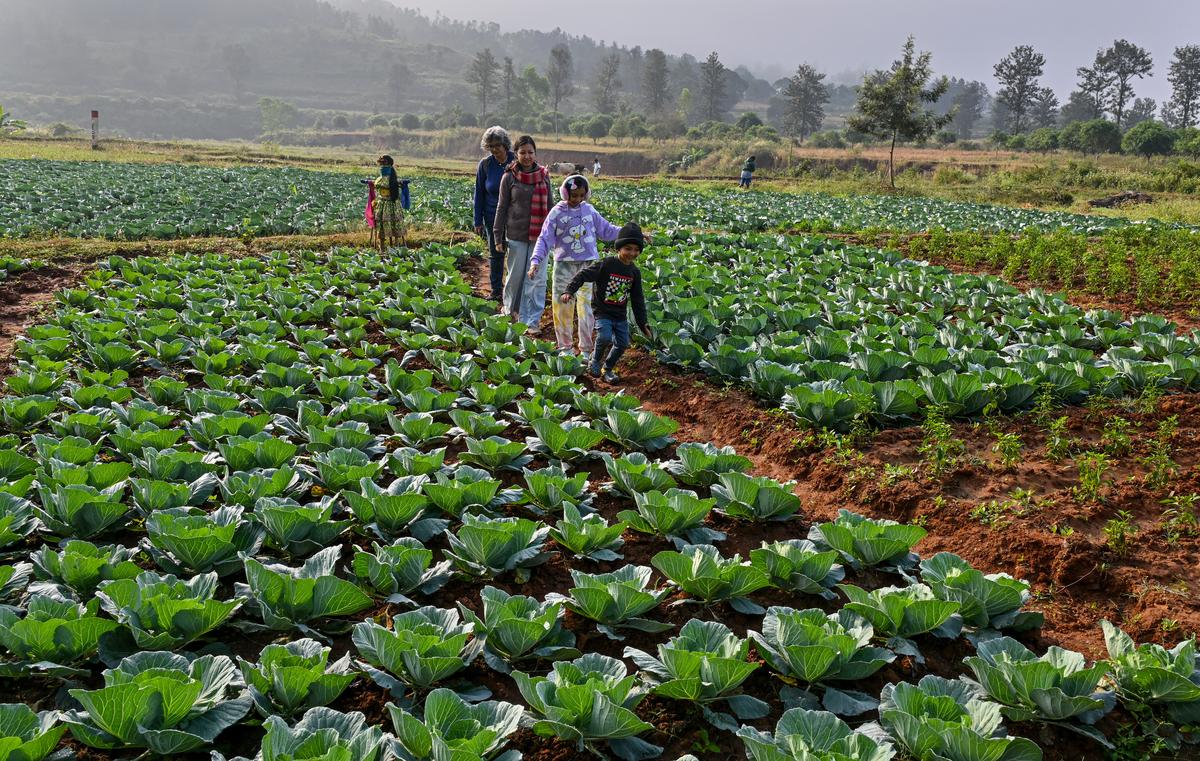
People walking through a cabbage field near Araku, 150 kilometres from Visakhapatnam.
| Photo Credit:
KR Deepak
Araku’s farming community is known for its natural farming practices, and this is the perfect time to see the farmers in action. Fields are brimming with a variety of vegetables as the harvest season sets in. Visitors can stroll through these farms, interact with the farmers, and learn about their natural farming methods.
The nearest farm stretches can be found at Gorapur, the next station on the Araku railway line. Here, the fields are a feast for the eyes, with cabbages, tomatoes, and paddy fields stretching as far as the eye can see. The villagers carry the harvested produce to the weekly shandy at Araku on Fridays and Sunkarametta on Sunday mornings.
Published – December 13, 2024 07:16 am IST
[ad_2]
Source link



![NZ v AUS [W] 2024/25, New Zealand Women vs Australia Women 2nd ODI, Wellington Match Report, December 21, 2024 NZ v AUS [W] 2024/25, New Zealand Women vs Australia Women 2nd ODI, Wellington Match Report, December 21, 2024](https://i3.wp.com/img1.hscicdn.com/image/upload/f_auto/lsci/db/PICTURES/CMS/393400/393416.6.jpg?w=1200&resize=1200,0&ssl=1)




